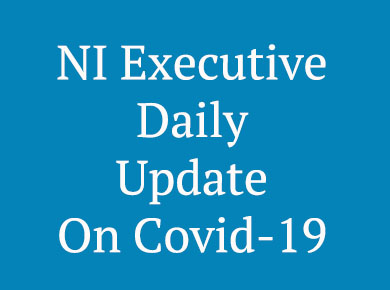Northern Ireland Executive ministers and their officials have over the past 24 hours been involved in a number of initiatives and critical decisions relating to the Coronavirus emergency.
Up to £17million in financial support has been made available to ferry operators to keep supply chains open during the COVID-19 emergency, Infrastructure Minister Nichola Mallon announced today.

The financial package, which is being jointly funded by the Executive and the UK Government’s Department for Transport, will assist for a two month period ferry operators who provide critical routes for food, medicines and other essential supplies.
Infrastructure Minister Nichola Mallon said: “Throughout this crisis I have been working closely with ferry operators to keep our necessary goods flowing and I wish to extend my personal thanks to these companies, for their determination to maintain our critical routes during this difficult period.
“Today we have been able to secure supplies to this part of our island, the impact of which cannot be underestimated and I am pleased to play my part. There’s more work to do – and I remain committed and focused to doing all I can to secure safeguards and support for people across Northern Ireland in the days ahead.”
The financial support will help Stena Line, P&O and Seatruck to maintain five key routes – Warrenpoint to Heysham; Belfast to Liverpool, Cairnryan and Heysham; and Larne to Cairnryan. The Northern Ireland Executive has agreed to cover 40% of these costs which are estimated between £10.6 and £16.6million.
Furloughed workers who are entitled to statutory family-related payments will not lose out during the COVID-19 pandemic, Economy Minister Diane Dodds and Communities Minister Deirdre Hargey insisted today.
Changes to the regulations mean that from tomorrow (25 April) people who are entitled to Statutory Maternity Pay, Statutory Paternity Pay, Statutory Adoption Pay and Statutory Shared Parental Pay will not be disadvantaged if they are furloughed.
Minister Dodds said: “I have been keen to do whatever I can to protect workers during the current crisis. The regulation changes that I have approved mean that those who are entitled to Statutory Paternity Pay, Statutory Adoption Pay and Statutory Shared Parental Pay will have the amounts calculated based on their full pay and not the 80% furlough rate.”
Communities Minister Hargey added: “The urgent regulations that I have approved changes how normal weekly earnings are calculated, to ensure that women who are receiving reduced pay as a result of being placed on furlough by their employer could be considered as receiving full pay for the purposes of Statutory Maternity Pay and Maternity Pay. This will mean a woman’s entitlement to Statutory Maternity Pay will not be affected.”
A new learning resource was also announced by Minister Dodds for furloughed workers and others who have lost their job as a result of the COVID-19 pandemic.
The Department for the Economy has partnered with the Open University (OU) to offer a range of free training courses to help people across Northern Ireland improve their skills and wellbeing, covering digital skills, employability and essential skills. The options include digital literacy, cybersecurity, entrepreneurship, leadership, communication, maths and English.
Free courses are also available online through Northern Ireland’s other universities and colleges and a range of other providers.
Minister Dodds said: “These courses are free for everyone and provide an opportunity for individuals to use their time at home to prepare for the future. Improving the digital skills of our workforce will also enhance our competitiveness and increase productivity in the long term.”
Health Minister Robin Swann and Communities Minister Deirdre Hargey announced the establishment of a free remote interpreting service for British Sign Language (BSL) and Irish Sign Language (ISL) users to help them access NHS111 and health and social care services during the COVID-19 emergency.
The temporary remote sign language interpreting service is provided by Interpreter Now, who provide similar access to NHS services across England, Scotland, and Wales and has two elements:
- A Video Relay Service – enabling Deaf people to telephone any Health and Social Care service via a remote BSL or ISL interpreter from da number of locations. The Deaf person contacts the interpreter via the service app, using their smartphone/ tablet/ computer or via a secure video link using a computer. Once they are connected, the interpreter telephones the Health and Social Care service provider on the Deaf person’s behalf.
- A Video Remote Interpreting service – enabling Deaf people to communicate with a Health and Social Care professional in person, via an online BSL or ISL video interpreter. The Deaf person and the Health and Social Care service provider can be in the same location, while the interpreter is online via secure video link on a screen in the office (e.g. a tablet, smart phone, or computer).
The temporary service, funded by the Department of Health and Department for Communities, has been established in partnership with the Health and Social Care Board and would provide the Deaf Community with access to all health and social care services and NHS111 24 hours a day, 7 days a week.
Minister Deirdre Hargey announced the 2020 Líofa Gaeltacht Bursary scheme will be rolled over into 2021 following the cancellation of this year’s Gaeltacht Summer Courses for Irish language students as a result of the COVID-19 pandemic.
The Minister confirmed: “Successful applicants from the 2020 scheme will be given the chance to attend the summer colleges next year instead. Deposits will be paid to Irish Language colleges in the current year in order to secure available places. This will also help the colleges to meet their administrative costs. I have asked my officials to explore options for further supporting the learning of Irish through Líofa and through partnership work with Foras.”

























